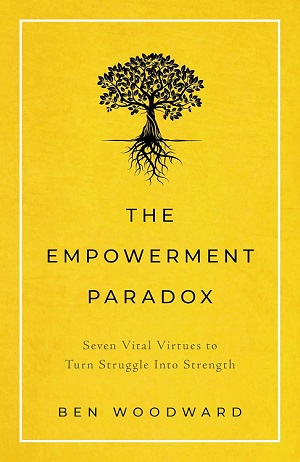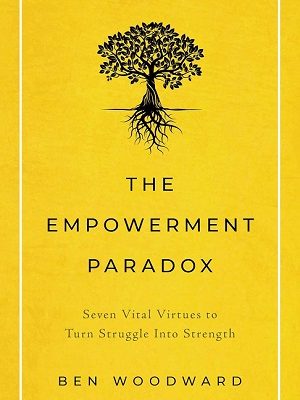The Empowerment Paradox: Seven Vital Virtues to Turn Struggle Into Strength by Ben Woodward explores how life’s adversities can be transformed into sources of strength and personal growth. The key lessons from the book emphasize the importance of embracing hardship, rather than avoiding it, to cultivate resilience and purpose. Woodward discusses seven vital virtues that help turn struggles into empowerment, allowing individuals to face challenges with strength and wisdom. Here’s a breakdown of the key lessons from the book:

1. Embracing the Duality of Life
Woodward highlights that life consists of both joy and suffering. By accepting this duality, we can prepare ourselves for the inevitable challenges that come our way. Struggles should not lead to hopelessness, but instead, offer valuable life experiences that strengthen our resolve. This mindset fosters a more grounded and optimistic outlook, even in difficult times.
Read: Untamed
2. Your Response Defines You
A critical lesson in the book is that it is not the struggles themselves that define a person but how they choose to respond to those struggles. By cultivating the right mindset, we can shift our response to adversity and see it as an opportunity for growth. This change in perception empowers us to develop inner strength and resilience.
3. Growth through Adversity
Woodward explains that periods of adversity are often followed by empowerment and personal transformation. Just as barren seasons in nature precede a harvest, struggles are often necessary for deep personal growth. By enduring hardship, individuals can emerge with a higher sense of purpose, confidence, and strength. This transformation is at the heart of the empowerment paradox.
4. The Power of Perspective
The book encourages us to evaluate and reframe how we see our suffering. By considering struggles as valuable experiences rather than setbacks, we unlock the potential for personal empowerment. This shift in perspective leads to a more meaningful and balanced life, where adversity is seen as an essential element of human existence.
5. Joy through Struggle
Woodward challenges the notion that joy is something to be pursued outside of ourselves. Instead, true joy comes when we stop chasing it and allow it to emerge naturally through the process of overcoming difficulties. By embracing life’s struggles, we can find joy in unexpected places and become more fulfilled.
6. Virtues as Tools for Growth
The book outlines seven key virtues that can help individuals navigate hardship: courage, patience, resilience, gratitude, wisdom, humility, and love. These virtues equip us with the emotional tools necessary to turn struggles into sources of strength and empowerment. Mastering these virtues not only helps us survive adversity but thrive in its wake.
7. Purpose Beyond Pain
A recurring theme in The Empowerment Paradox is that suffering, when met with the right mindset and virtues, leads to a deeper sense of purpose. This purpose is not found in spite of suffering but because of it. By aligning our struggles with a greater sense of meaning, we can transform pain into a powerful motivator for growth and fulfillment (Amazon).



